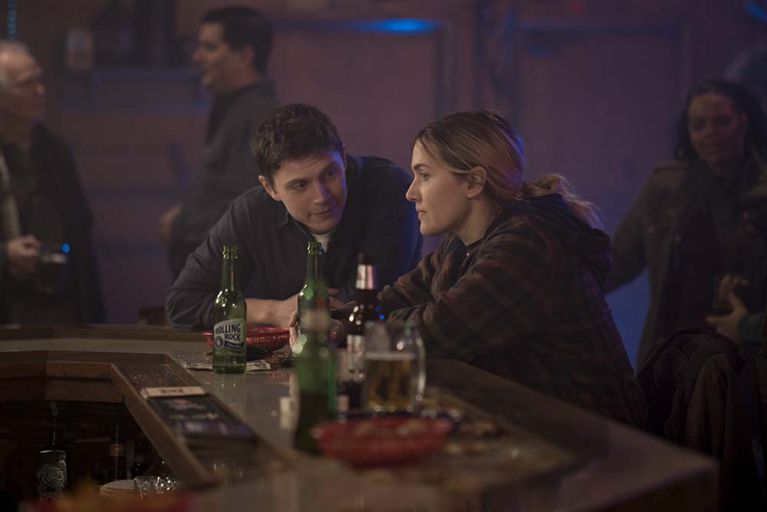Why We Are Obsessed With Mare Of Easttown

On Sunday night, fans of the
pic.twitter.com/8jAvmQr4Gm— Vulture (@vulture) May 11, 2021
3. The surprises are perfect (albeit horrifying)
There are few moments in recent TV memory as startling as that moment with Detective Colin Zabel (Evan Peters), or the revelation of Erin’s killer. But neither are of the a-ha variety: over his arc, Zabel evolves from the bane of Mare’s professional existence to a young man trying desperately to find professional and personal footing. He becomes crucial not just to our own entertainment (because Peters can play drunk better than someone who’s actually drinking), but to showing us another side of Mare.
Which is the same as the outcome of her investigation. From episodes one to seven, Mare changes and grows, and begins to use her own pain as a way of inviting the people around her to share theirs. Is the reveal of Erin’s murderer shocking? In a way. But what’s more shocking is how this moment introduces a version of Mare we’d yet to see. Finally, we come to view her as a friend, a mother, and the person she’s finally become after so many years spent mourning. It’s a surprise because it didn’t seem possible; because we’d yet to see Mare step outside of her pain.

4. But, the moments of happiness aren’t always fleeting
To be fair, all moments spent watching Mare are spent grappling with the suspicion that everyone onscreen may be terrible and that they all may be responsible for Erin’s catalytic murder. And in case you’re gearing up to watch it, I won’t say when to put your guard down.
But looking back (during the ending, when I watched several of my theories dissolve while scream-reading every recap I could), it was rewarding to note that some red herrings were just that, and that Mare’s life gets to include happiness. (Even if said happiness—SPOILER ALERT —comes in the form of the creepiest author in the world.)

5. Jean Smart is Jean Smart
Starring as Jean Smart, playing Jean Smart.
Well, no. But her turn as Mare’s mom is a master class in teaching viewers how to fall in love with complicated, frustrating, occasionally outright mean mother figures. Also: a reminder that upon finishing Mare, it is essential to watch everything Jean Smart’s ever been in—including her star turn in the new HBO comedy, Hacks.
6. Mare feels like a perfect series for our times
The thing about 2020-2021 is that most of us are Going Through It™. We’ve lost parts of ourselves. We’ve learned to build our lives back up after parts have crumbled, and we’re wading through unspeakable anxiety, grief, sadness, and anger because we’ve realized how little we’re in control of.
And that’s exactly what you get from Mare of Easttown. It runs the gauntlet of the feelings that have defined us for the last year and a half, and gives us an outlet to work through some of what we’re all feeling. Obviously, the series does not take place in a pandemic (though filming was delayed because of it), but the same emotions that have summed up so many months define Mare and make some characters even more relatable.
Which likely was never the objective. But look: the best art will always connect itself to the mindset and feelings you need to unpack the most. And while Mare’s reality belongs only to her, it’s an invitation for everyone to sit with our traumas, our grief, and our heartache, learning that no matter how hopeless something may feel—it doesn’t have to be.
GET CHATELAINE IN YOUR INBOX!
Subscribe to our newsletters for our very best stories, recipes, style and shopping tips, horoscopes and special offers.